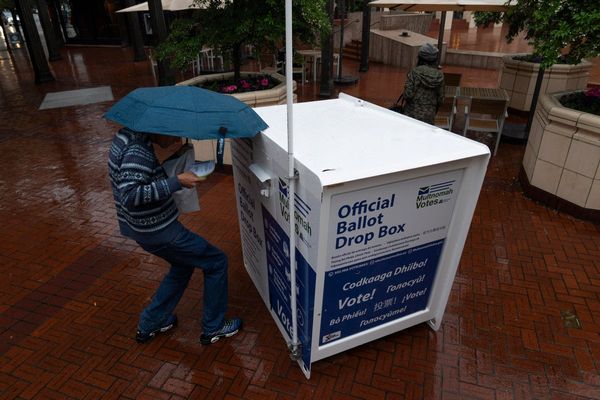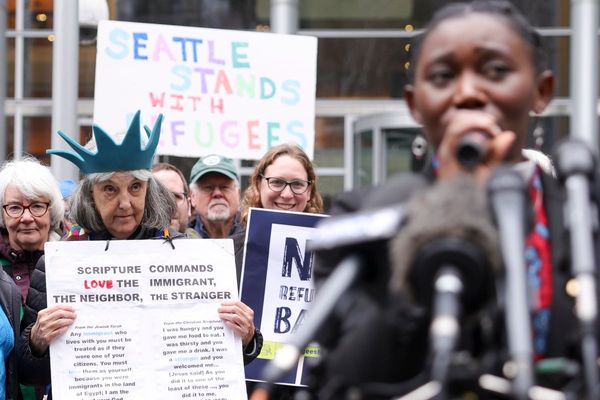
The UK foreign secretary, James Cleverly, has said all Nato allies are backing a plan to give Ukraine a fast track to Nato membership of the kind offered to Sweden and Finland earlier this year.
Speaking on the margins of the two-day Ukraine Recovery conference in London, Cleverly said the UK was “very, very supportive” of Ukraine being able to join Nato without the usual need for it to meet the conditions set out in a Nato membership action plan (Map).
The French foreign minister, Catherine Colonna, was more cautious but said circumstances had changed since 2008 when Ukraine was last offered Nato membership on the condition it met the terms set out in an action plan.
The issue of the terms on which Ukraine is offered Nato membership has been dividing allies before a Nato summit next month. There have been concerns in the US and Germany that early Nato membership for Ukraine might provoke Russia, and change the Nato structure.
Cleverly said the Ukrainian army through the war had modernised and aligned its weaponry with Nato to make it possible to dispense with an action plan. The offer is conceived as an alternative to offering Ukraine a timetable for membership at the Nato summit in Vilnius next month. Ukraine would like a pathway with specific dates.
All sides have agreed that Ukraine cannot join Nato – and thus be covered by its guarantee that an attack on one is an attack on all – until the war is over. But the offer to drop the Map would be a signal of European intent.
The prospect of relatively imminent Nato membership is also seen by Ukraine’s leadership as a precondition to persuading western companies that investment in Ukraine’s economic recovery is a worthwhile risk.
Cleverly said: “We have seen Ukraine evolve and evolve quickly. Jens Stoltenberg at the Nato foreign ministers [summit] said many of the requirements of the membership action plan are actually being delivered. The reform of their armed forces is happening while engaged in conflict and I think the UK’s position is that it would be very, very supportive if we moved on from the membership action plan recognising that the offer to both Sweden and Finland did not require that.
“The Ukrainians have demonstrated their commitment to military reform required for Nato membership through their actions on the battlefield, and I think all Nato allies recognise that.”
Colonna was also supportive, if more qualified. She said: “Perhaps we won’t require the membership action plan mechanism – perhaps not, I say, perhaps not – which was planned in 2008. We are a long way from 2008. Time has passed, the situation is quite different.”
Speaking by video link, Ukraine’s president, Volodymyr Zelenskiy, asked the conference: “What does the world see now? Does it recognise Nato’s moral leadership in protecting peace? This is only possible with Ukraine in the alliance.”
He also accepted in a BBC interview that progress in the country’s current counteroffensive against Russian forces had been “slower than desired”.
Zelenskiy also told the conference that Ukraine had made the west, including the EU, more united than ever before and could become an engine for green world growth and security for decades.
The Ukrainian president argued that the fight for his country was a way to protect freedom and security across the world and, once at peace and free from Russian interference, Ukraine could be “the largest source of economic, industrial and technological growth in Europe for decades and decades”.
He told the two-day conference it was time to move from visions of Ukraine’s recovery to specific agreements.
The European Commission president, Ursula von der Leyen, told the meeting Ukraine was running a budget deficit to 2027 of €60bn (£52bn) and blamed the destruction on “one man’s delusional attempt to restore a lost empire”.
She said she was sure Ukraine would become a member of the EU, and gave an upbeat progress report on Ukraine meeting its pre-accession commitments towards democracy, judicial reform, media freedom and anti-corruption. “Ukraine had accelerated its reform programme with impressive speed and resolve,” she said, adding that before the summer break the EU would give a report on how Russia should pay for the damage it has caused in Ukraine.
Antony Blinken, the US secretary of state, said the US was providing a further $1.3bn (£1bn) in aid, including $520m to overhaul Ukraine’s energy grid, of which half had been destroyed by Russia. A further $675m would be provided to update its infrastructure, ports and border crossings, including funds to digitalise trade. He said the US had provided $60bn in aid but eventually only the private sector could provide the investment Ukraine needed. Blinken also said: “Russia will eventually bear the cost of Ukraine’s reconstruction.”
Richard Branson, the Virgin owner and a Ukraine ambassador for business, condemned those companies still operating in Russia and called for sanctions to be strengthened and loopholes to be tightened.
Zelenskiy tried to present a vision of how a postwar Ukraine could become a future bulwark for security, stability, democracy and prosperity across the west. He said Ukraine could provide grains to 600 million people, lithium for batteries, metallurgy, fertilisers and green energy.
He added that there was no alternative to the green transformation of the economy saying “each strike on our energy facilities ends the era of fossil fuel dominance and a world over-dependent on one supplier, Russia”.
He said Vladimir Putin had invaded Ukraine not only to steal resources, but because Russia was “worried about our democracy because democracy paves the way for rule of law and getting rid of corruption”.
He urged western leaders to have the “courage” to acknowledge that his country was already a key part of their economic and defence alliances. “We are only waiting for the courage of the alliance leaders to recognise this reality, politically,” he told the conference.
Rishi Sunak, the UK prime minister, said: “Before this terrible war, Ukraine’s economy was becoming a huge investment opportunity. It was the breadbasket of Europe, exporting millions of tonnes of food and grain each month, a top-five exporter of iron ore and steel, a leader in energy – pushing forward renewables, hydrogen and electric vehicles – and a startup nation […] with a thriving tech sector, which actually had a record year in 2022.
“The truth is, that opportunity is still there today – in fact the war has only proved how much Ukraine has to offer.”
He highlighted Ukraine’s technological expertise, saying IT experts and the military had developed a mobile app to track the Shahed drones being used by Russia. Sunak said that when he visited Kyiv in November, he saw the people’s spirit of “ingenuity and innovation”.
Speaker after speaker at the conference drew applause by saying that Russia would have to contribute to the cost of Ukraine’s recovery, put at $400bn by the World Bank in May.
Blinken said: “Let’s be clear: Russia is behind the destruction of Ukraine. And Russia will end up bearing the cost of rebuilding Ukraine.”
But a preliminary paper prepared by the European Commission suggests no legal avenue has been found to seize frozen Russian sovereign assets that does not risk legal challenge.







